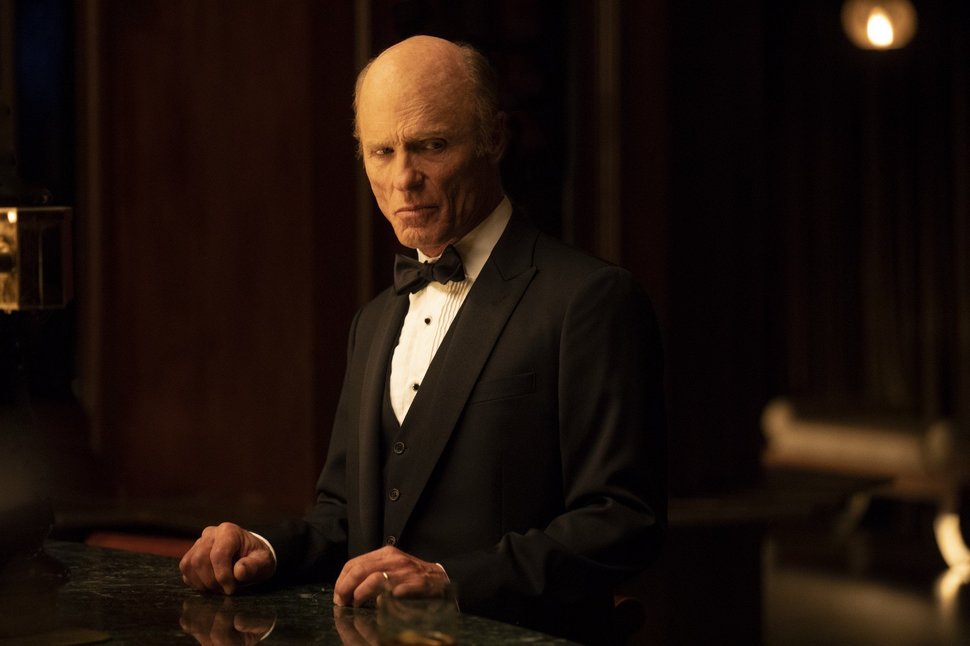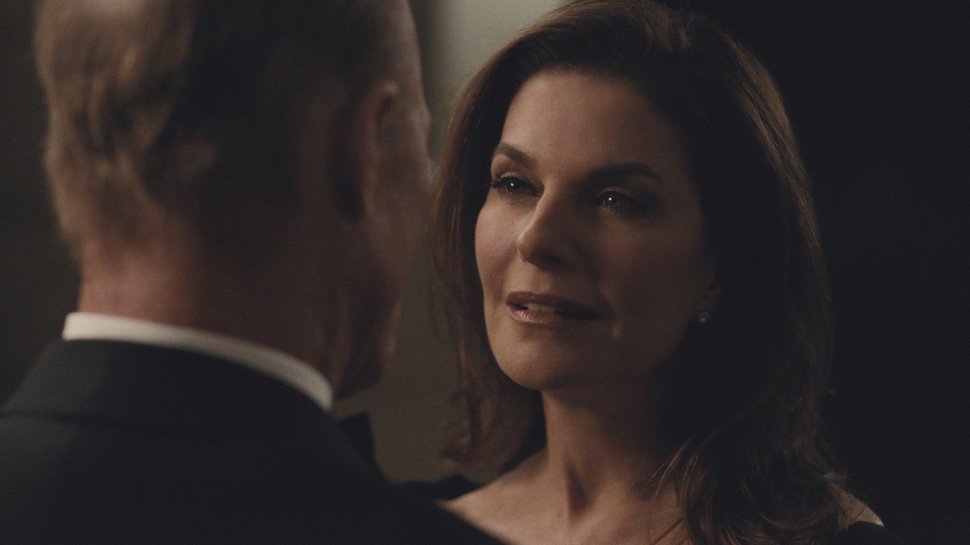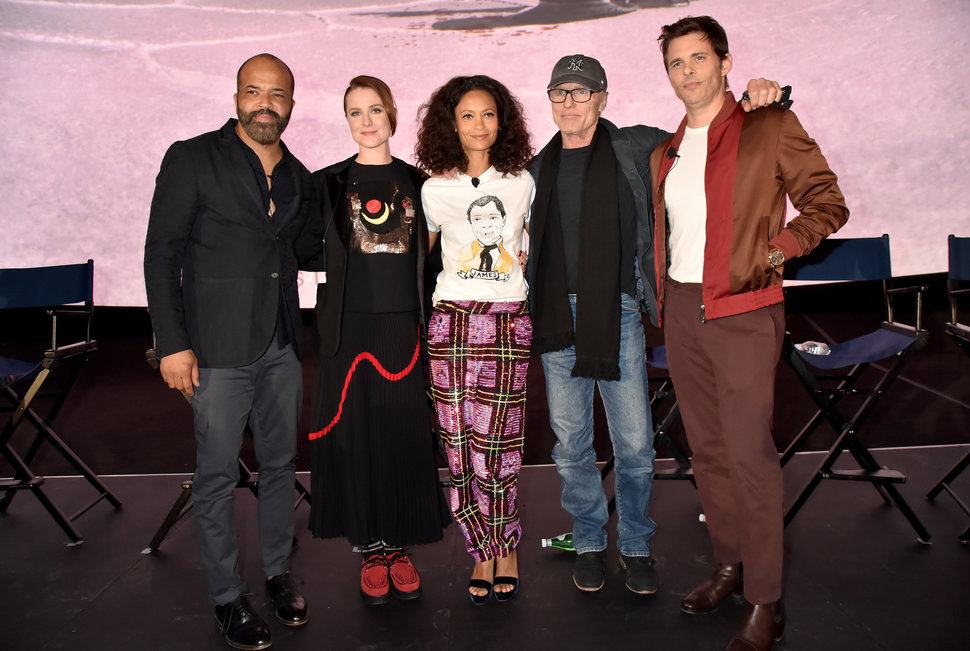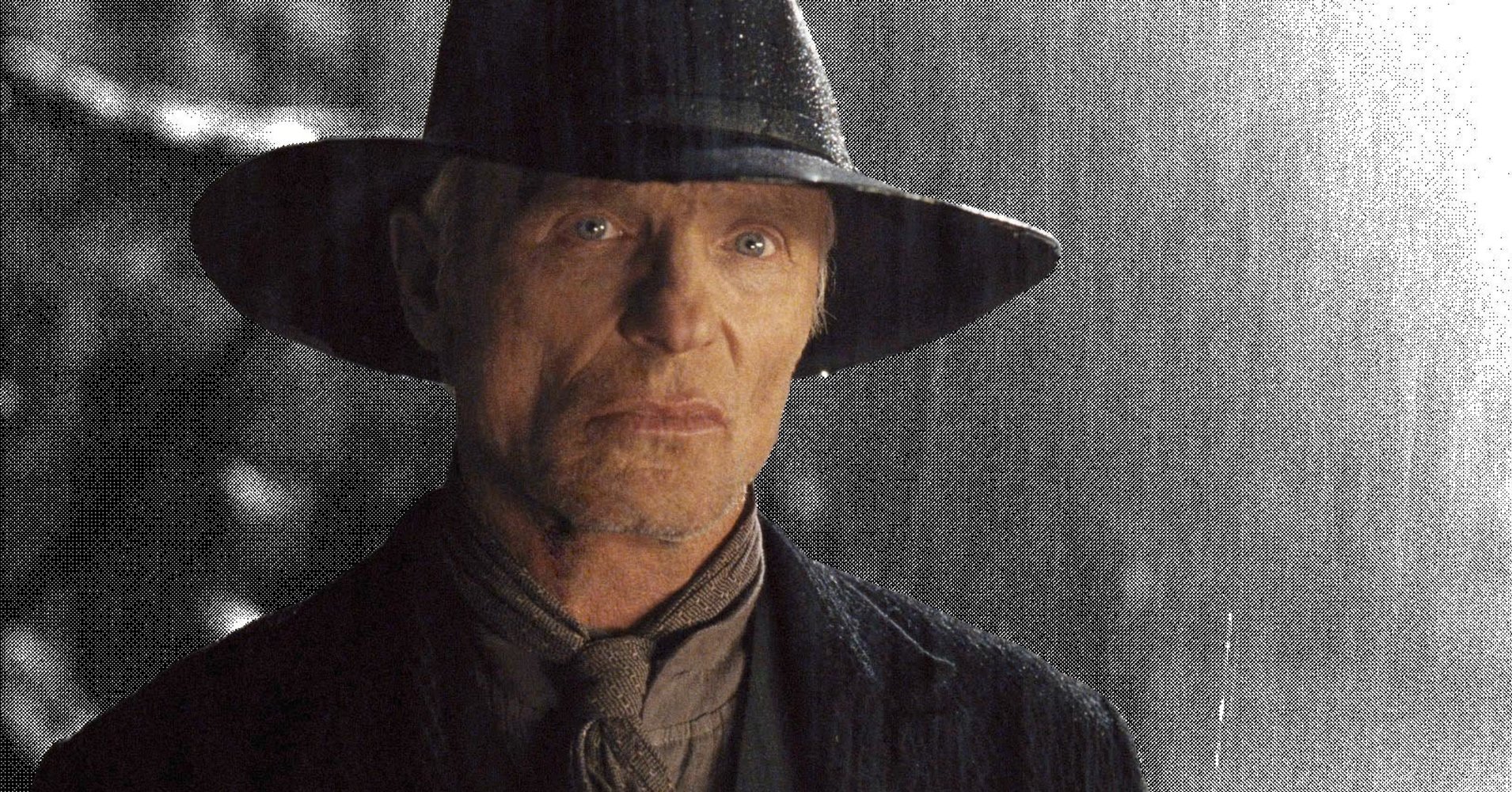[ad_1]
The actor behind the Man in Black is as confused about the plot of “Westworld” as the rest of us.
“Even when I watch it,” Ed Harris said, “there’s a lot of it that I don’t always understand.”
“Yeah, I have no idea where it’s heading,” he added. “I don’t even know if I’m in it or not [next season]. I figure I am? But I don’t know in what capacity, and I don’t know what the what will be happening.”
Harris has been a Hollywood fixture since the 1980s, but these days the 67-year-old actor admits he’s probably more recognizable as the pot-stirring cowboy on HBO’s ever-baffling sci-fi Western drama series. Now in his second season as the show’s quasi-villain (a kind investor-turned-murderous dad who’s hellbent on figuring out what makes the robot park tick), he’s as lost as the viewers when it comes to the series’ famously hard-to-follow timeline.
“I got to tell you, the way this season ends, I have no idea what’s going to be going on,” he concluded.
Harris called me himself from the comfort of his Malibu, California, home last week to talk about the penultimate episode of “Westworld” Season 2, dubbed “Vanishing Point.” In it, the Man in Black, badly injured after being shot by both Maeve (Thandie Newton) and Lawrence (Clifton Collins Jr.), comes to blows with his daughter Grace (Katja Herbers) after reminiscing about the tragic death of his wife and her mother, Juliet (Sela Ward).
Earlier this season, viewers assumed Juliet died by suicide amid struggles with substance abuse, but in Season 2, Episode 9 we learn that she couldn’t accept her husband’s obsession with the android theme park. After finding his profile ― a dossier of sorts containing video footage of every seedy moment he’s experienced in Westworld ― she is sickened by his violent behavior. Before taking her own life, she deliberately leaves the profile behind for her daughter to uncover. Grace eventually finds it, but when she brings that information to the attention of her father, instead of hearing her out, he proceeds to kill his only child out of fear she’s just another one of park creator Ford’s (Anthony Hopkins) bot spies.
Over the phone, Harris discussed the Man in Black’s devastating disconnection with reality and the longstanding theory that he’s actually an android himself. Oh, and he made it very clear he has no idea what’s going on in “Westworld,” either.

HBO
You’ve had a stellar season but in Episode 9, you deliver, my friend. Let’s discuss some of what goes down. When you read the script, what were your thoughts?
I knew there were going to be some scenes in the past, in terms of the history with his family, so I was looking forward to it. Then I read it and thought, yeah, this will be fun to chew on.
It’s interesting because I’ve been watching it week-to-week with my wife [actress Amy Madigan] and there are certain weeks where I’m hardly in it, or not in it at all, and I feel like my character is kind of superfluous in terms of what’s really going on. But I’m glad there are certain episodes where you get back to the Man in Black and hopefully get intrigued by what is going on with him. Episode 9 was a good one. Working with Sela and Katja was intense.
The Man in Black is a central player, for sure, but I agree that it must be hard to keep track of your storyline among all the other characters on the show.
I got to the point last year when I would just focus on what was going on with the Man in Black because there’s so much going on [in the show]. Even when I watch it, and as much as I am a part of it, there’s a lot of it that I don’t always understand.
I find it fascinating and really interesting and I love watching it, but I don’t always get the intricacies of what’s taking place. [Laughs]
You sound just like me as a viewer!
Yeah, I think it’s got to be true of most viewers! It’s like “Game of Thrones,” in a sense that I loved watching that and I didn’t read the books. When I’m watching it with my daughter it’s great, because she can tell me everything about who everybody is and what’s going on. It’s one of those things where you get the gist of it, but you don’t necessarily understand all the minutiae.
It is probably a different experience to be a part of a show that has people heading to Reddit and message boards to discuss the small details of the plot. What has that sort of “spoiler” attention been like for you?
Well, I don’t pay any attention to all the things that are written about it, so that doesn’t affect me at all. It’s kind of funny because more people have probably seen me playing the Man in Black than all the films I’ve made combined. I wouldn’t be surprised! So that’s a bit odd.
Even when I watch [Westworld], and as much as I am a part of it, there’s a lot of it that I don’t always understand. I find it fascinating and really interesting and I love watching it, but I don’t always get the intricacies of what’s taking place.
Ed Harris
Did you get the sense when you signed on to play this role that it would get a lot of attention?
I figured when HBO was putting a lot behind it ― our budgets are pretty big. Jonah [Nolan] and Lisa [Joy, the creators] are committed to making this a special kind of deal. Their integrity and their commitment and the depth of their work on creating this thing, it’s very impressive. So I was like, yeah, if I can help these guys fulfill their vision, I’d be happy to try. I didn’t really go into it knowing how I would feel doing it, it was just a really fun character. I mean, Man in Black? What the heck! I was going to have some fun.
There’s so much programming today, yet the Man in Black still feels like a unique character on TV.
Yeah, what, there’s maybe like 500 shows a year now or something? It’s unbelievable. I’ve been doing this for a while and so I still enjoy the acting thing and the more challenging a moment or a scene is, the more that calls on me to dig deep, I like that. It’s fun. It makes me feel like I’m doing something.
You get to play two different sides of this character, too: Man in Black in Westworld vs. William or Bill in the real world. How do you approach each situation?
You just try to … find the truth of the moment. Once you’re out of the Man in Black outfit and you got a suit on, you feel different, you know? [Laughs] And you’re working under different circumstances and you’re working with different people ― your wife and daughter, in a domestic situation that’s difficult ― so, as an actor, it’s just kind of organic.
How conscientious are you of your physical movements as an actor? Your walk or the way you hop on a horse to illustrate the Man in Black’s demeanor. Especially in a role like this, where every little word or movement tricks the viewer.
I think I’m probably as conscientious of my physical movements as I am of my vocal patterns or gestures of intent.
In Episode 9, for example, the Man in Black seems to be struggling with what is real, and he starts to question whether he, himself, is a robot. So viewers start assuming you might be one, too. How do you go about playing that?
He’s been so immersed in this park and in this other reality, this other dimension, that he’s lost it. He basically gets lost in it and he’s not sure what is going on. And so, especially working on this show, it’s not that difficult to play, “I don’t know what’s going on!” [Laughs]
Ed Harris doesn’t know, the Man in Black doesn’t know …
[Laughs] Yeah, I have no idea where it’s heading. We’re not supposed to start shooting Season 3 until next June, so I don’t even know if I’m in it or not. I figure I am? But I don’t know in what capacity, and I don’t know what the what will be happening. We’ll find out.
Well, there is a theory floating around that the robot Ford was working on in Season 1 was William ― was you. Can you give us any taste of whether you think that could be a possibility?
No, because I don’t really know! As the show progresses, there seems to be more and more dimensions. There’s the future, there’s the past, there’s the present, and so anything’s possible. But I can’t say much more than that.
Anything is possible, as we saw Ford die in the finale last season, and he’s back in full swing. Probably not a bad gig acting alongside Anthony Hopkins, of course.
No, it’s good. I love working with Anthony.
Let’s talk about that scene with Ford in Episode 9, where he gives you the profile of William/the Man in Black and all he’s done in the park. It comes back to bite him in a huge way.
Right. That’s the thing that sets him off on this whole journey he’s on. For years, he’s saying, “I’m going to blow this effin’ place up.” He’s very disturbed ― disappointed is not the word, but he’s enraged that his profile is such that he just thinks it’s bullshit. It’s also a total intrusion and he disagrees with it and he’s saying, “This was my idea, but it’s a bad one and it’s got to stop.”
We see his story unfold from William to the Man in Black. How does watching all that play with his own mind? A good guy turned a villain again and again.
He says, at some point, something to the effect of, “This part of me has always been with me.” He accepts that and realizes the park is a place where he can exorcise that part of him, that’s why he’s been going back every year. When he’s a civilian, he’s being honored for being this philanthropist ― he’s a very well-respected citizen on the outside. But he’s got this part of him that he knows is true and that he tries to confine to the park.
Now, he says he’s not leaving the park and will just be this guy and do what he’s got to do. It’s very deep and complicated and gets down to the core of this guy’s humanity. Sometimes it’s a little tricky to mine that, but it’s very helpful to have Jonah and Lisa around, because their combined minds work in a much different way than mine. It’s very helpful to me to ask them questions or have them warn me about what they really have in mind or what’s really going on, and that helps me deepen the reality of what I’m doing.
I’m sure it helped having Sela Ward join this episode and for you to see how the Man in Black’s actions have affected his family life outside of the park. How was it to dive into a husband-wife storyline for a little bit?
It was interesting, you know. She’s the one character, or the only other person in the outside world, who kind of knows the truth of this guy. She sees beyond his façade of being this respected citizen, and she calls him on it.

HBO
You really got to dig deep not only with Sela, but with your daughter, played by Katja Herbers. What we see at the end is the Man in Black seemingly kills his own child. Robot or human, that will surely mess with his psyche.
Yeah, it was a little surprising, I suppose, but [pause] the years that he’s been in this park, especially now that he says he’s not going to leave, I mean, his mind is in another place. He’s paranoid and knows that Ford is full of tricks and who knows what’s real and what isn’t? In that moment he just says, sorry, but you’re not even my daughter, so, goodbye. And then he goes, wait a minute, was she? Should I end my life? What should I do? He doesn’t know what to do.
Are you worried at all about his path moving forward?
Well, yeah. I got to tell you, the way this season ends, I have no idea what’s going to be going on. I’m not nervous about it, but I really have no idea.
Can you tell us anything about the finale?
No, I can’t. [Laughs] I was instructed not to say an effin’ word, so I’m not going to!
Do you know if Jimmi Simpson will still be around portraying Man in Black as a younger man?
Who knows? I don’t know. I really don’t.
You guys didn’t know you were the same character when you first started the show, correct?
I don’t know if he did, but I sure didn’t. I mean, I saw Jimmi walking around the trailers on set one day and somebody told me, “You know, that’s you as a younger man.” I said, “What?!” I didn’t even know!
Jimmi told me it’s very intimidating to know he had to “grow up” to be Ed Harris.
Ohhh, I don’t think he’s intimidated anymore. We have a really good relationship. Sometimes he’ll email me some questions, like, “We’re going to do this scene where we both have to do the same thing with Delos. Are there any mannerisms or anything, blah, blah, blah?” I think Jimmi does a great job. He’s really cool, especially his relationship with Evan [Rachel Wood] and all that.
Do you and the rest of the cast ever theorize with each other about what’s going to happen?
Well, I have a feeling maybe Evan does with Thandie [Newton] or James [Marsden] or something, but I don’t really get into it too much. Just trying to do my thing, you know?

Jeff Kravitz via Getty Images
Yes, you said you try to stay out of the theory spirals. But in the opening credits, did you notice the robot babies? Will there be kid robots running around soon?
I have no idea! I really don’t! [Laughs] I mean, if they’re robot kids, do they just stay kids? I guess? It’s not like these people are getting older! I don’t know, that’s a mystery to me. I don’t know.
And then of course there was the whole James Delos-human-droid-immortality storyline, which you were a part of.
Yeah, it doesn’t seem to be working out too well for James! [Laughs]
Portraying something like that on-screen must be a mind trip, just considering how much our own world has grown, tech-wise, in the last 20 years.
It was a mind trip, but I got to tell you, my mind doesn’t really go there. I’m such a kind of, I don’t know, practical, realistic person in the way I look at things. I talk to Jonah and he’ll go on for minutes and minutes about what’s going on and it goes in one ear and out the other for me because I don’t really … they just think in different ways. Their whole selves are in a realm that my mind doesn’t even go to. I try to deal with the reality scene by scene, line by line, of what my character is doing and I don’t really cogitate too much about the ramifications of it all.
I mean, I know that artificial intelligence is becoming more and more a part of our world and I wonder where that all is going to end up, but I don’t spend a ton of time thinking about it.
Emmys season is coming up. Do you ever consider the possibility of award recognition, or are you just focused on the work?
There are certain roles that you know are more, not flashy, but more in-depth or more liable to be recognized. But that doesn’t really affect me. I don’t really think about it because it’s such a crapshoot anyway — you work on a film these days, especially on any kind of independent movie, you don’t even know if it’s going to be seen. The fulfilling part of it is the work: the rehearsal, the preparation, the time in front of the camera. After that it’s anybody’s guess.
That’s one of the things that’s kind of cool about being on “Westworld” is you know it’s very successful, you know people are into it, you know it’s a “hit,” so you know it’s going to be seen. But still, it would be just as fulfilling if it wasn’t. It’s about what you gain, what you learn … I just try to appreciate the creative part of it and the rest of it is up for grabs.
“Westworld” airs on Sundays at 9 p.m. ET on HBO. This interview has been edited and condensed for clarity.
This has been a special edition of “Doesn’t Look Like Anything To Leigh … And Bill,” HuffPost’s weekly recap in which we break down the craziest thing you might have missed on “Westworld.”
Want more? Read all of HuffPost’s “Westworld” coverage.
[ad_2]
Source link

